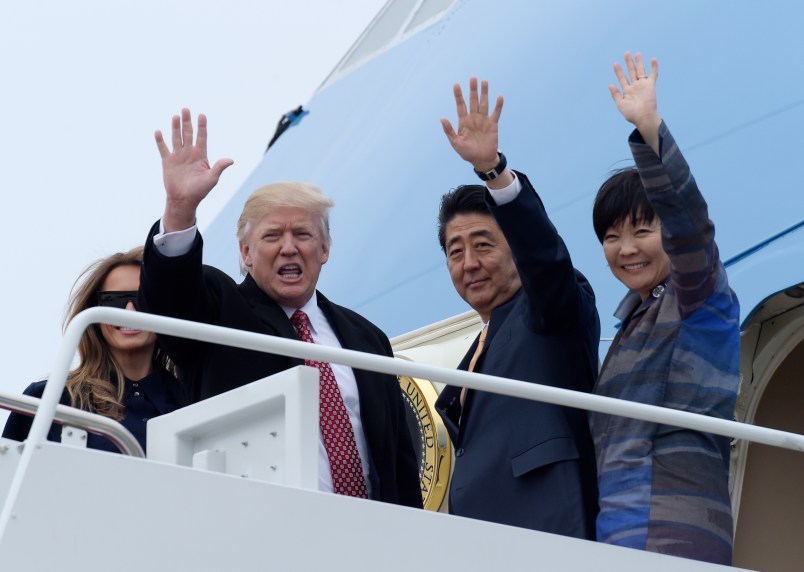WASHINGTON (AP) — In the world of diplomacy, some things are bound to get lost in translation.
President Donald Trump, who sat next to Japan’s first lady during a dinner at a recent international summit, says Akie Abe can’t muster even a “hello” in English.
In fact, she can handle a basic conversation in English, according to two people who have worked on events with the first lady.
So was something lost in translation, or was there an intentional snub?
In a New York Times interview this week, the president noted that he was seated next to the Argentine and Japanese first ladies at the Group of 20 summit dinner in Hamburg, Germany.
Trump described the wife of Japanese Prime Minister Shinzo Abe as a “terrific woman, but doesn’t speak English.”
“Like, not ‘hello’,” the president told the newspaper. “So I’m sitting there. There was one interpreter for Japanese, ’cause otherwise it would have been even tougher. But I enjoyed the evening with her, and she’s really a lovely woman, and I enjoyed — the whole thing was good.”
But there’s a hitch: Japan’s first lady apparently knows a lot more than just hello.
The Internet instantly responded, with a YouTube video emerging of Akie Abe delivering a 15-minute keynote address in English at a 2014 Ford Foundation symposium in New York. Video from a 2016 summit in Japan also features Akie seemingly following the conversation and making short comments in English at a spouses’ event.
The implication is that Ake Abe spoke more than enough English to politely chitchat with Trump, but instead chose to hide behind the language barrier.
The two people who have worked with the first lady both said it’s unthinkable to suggest Abe may have been trying to avoid a conversation with Trump. Both spoke on condition of anonymity because of the sensitivity of evaluating the first lady’s English proficiency. The Japanese prime minister’s office told The Associated Press that Trump’s comments were based on speculation.
The two people who had worked with Akie Abe said she does frequently rely on a translator who almost always accompanies her. And she would hardly be the only Japanese official with functional English to do so.
Many Japanese officials and business leaders who speak fluent English often choose to speak in Japanese and use interpreters at public events in order to avoid misunderstanding, according to Foreign Ministry officials. They could not say if the Japanese first lady has such a policy.
The same holds true for many leaders around the world, who opt to use their native language in official settings.
Putin himself is proficient in English and is often heard correcting his own translators, but he almost never speaks English in public.
German Chancellor Angela Merkel also engages in small talk in English, but tends to stick to German in her official remarks.
Putin and Merkel speak to each other privately in a mixture of German and Russian, but use their native languages when the cameras are on.
There are others who make a point of speaking English in public.
Last week in Paris, France’s President Emmanuel Macron answered an American journalist’s question in English, which signaled a departure from French tradition of speaking in mother tongue at official events. Macron also delivered an address to the American people in English after Trump pulled out of the Paris climate change agreement.
Ukraine’s President Petro Poroshenko made official remarks in the Oval Office exclusively in English during a June visit. It was his way of reminding Trump: You have a friend in Ukraine, a friend who speaks your language, diplomatically and literally.



